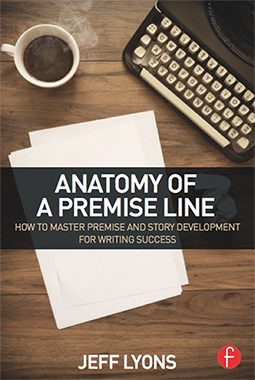 Every book you’ve ever read in a store and every film you’ve ever watched on a screen follows a timeless structure. It’s invisible; you can’t see it but it resonates with us on a subconscious level. It’s what makes a story a story, and without it, everything collapses. Your fleshed-out characters and detailed world must work within this structure, so do yourself a favor and build the foundation before working on the windows!
Every book you’ve ever read in a store and every film you’ve ever watched on a screen follows a timeless structure. It’s invisible; you can’t see it but it resonates with us on a subconscious level. It’s what makes a story a story, and without it, everything collapses. Your fleshed-out characters and detailed world must work within this structure, so do yourself a favor and build the foundation before working on the windows!
This fundamental structure is called the premise line. It isn’t sexy, but it’s going to change the way you write forever.
The Premise Line
If you want your scenes to make sense and have a meaningful impact, then look towards the writers whose scenes cost a premium to make. Those writers aren’t on roleplaying forums–they’re in Hollywood and are known as screenwriters, and everything they write has to matter and resonate with executives who have millions at stake.
Jeff Lyons is one such screenwriter, and his book Anatomy of a Premise Line is the reason for this blog post. It’s also the reason why Samurai of Hyuga Book 3 wasn’t a giant mess! The following premise line is for a classic 1975 film. See if you can guess which:
Clause#1 = Character, Constriction
Clause#2 = Desire, Relationship
Clause#3 = Resistance, Adventure
Clause#4 = Adventure, ChangeA fearful, “outsider” Police Chief [Clause#1] of a small, coastal vacation town is asked to investigate the possible shark death [Clause#1] of a local swimmer, and his worst fears are realized when a marine biologist confirms the cause of death, prompting the Chief to hire a crusty local fisherman [Clause#2] to hunt down and kill the beast [Clause#2]–forcing the fisherman to take the Chief and biologist [Clause#2] along on the hunt; only to find himself caught between the town’s greedy mayor [Clause#3] demanding a quick kill so beaches can be reopened to make money again, and the controlling, resentful fisherman [Clause#3] who thinks the Chief is a wuss, and who doesn’t need or want the Chief and biologist on his boat–leading to the three men bonding as a team as they battle the monster; where the Chief proves his value and courage, overcomes his fear of water, and secures his place in the community when he saves the town by killing the beast [Clause#4].
That is the premise line for Jaws. You’ll notice that it’s written as a giant sentence, and that’s by design. This helps to trim the fat and bring us to the barebones foundation of the story. That foundation is broken into four clauses, which will always be present even when you’re up against something more subtle than a giant shark!
Story VS Situation
The first story you ever wrote wasn’t a story. That graphite smudge you made in your creative writing course back in grade school also wasn’t a story. The fanfiction you posted online, the one with the self-insert Yu Yu Hakusho character, that wasn’t a story either! Those were all situations–written entertainment and engagement. Situations are traps even veteran writers fall into, and here are the warning signs:
- A situation is a problem, puzzle, or predicament with an obvious and direct solution.
- A situation does not reveal character; it mainly tests a character’s problem-solving skills.
- A situation’s plot twists ratchet up the puzzle or mystery, but rarely open character windows.
- A situation begins and ends in the same emotional space.
- A situation has no, or a very weak, moral component.
There’s nothing more painful than writing pages and pages only to find yourself trapped into a situation instead of a story. The premise line acts like a lighthouse in the midst of a storm, and it’s incredibly comforting to have that sense of direction when you’re 100k words in.
Personal Experience
In Book 2 MC is a “fish out of water” when it comes to shogi, and is forced to deal with a brat inside his/her head to win a tournament. That’s an awesome premise and ecompasses Clause #1 and #2, but somewhere between romantic subplots and spiritual stuff I missed a crucial aspect of Clause #4: change. MC didn’t really change in Book 2 aside from gaining a healthy aversion to board games.
The Baron’s island was all setup for Clause#1 of Book 3, which didn’t make for a satisfying ending. With this knowledge in mind, I wanted to make sure the third book in the series was going to be a complete story. Turned out I needed to make two for the price of one!
Clause#1 = Character, Constriction
Clause#2 = Desire, Relationship
Clause#3 = Resistance, Adventure
Clause#4 = Adventure, ChangeBook 3 Baron Island Premise Line:
A murder mystery sparks MC [Clause#1], an uneducated yet pragmatic ronin, into an investigation [Clause#1] to clear Hatch’s name and save his life [Clause#2]; he is joined by Toshie and Masami [Clause#2], and together the very different minds must observe and deduct the grisly truth of the murder [Clause#3]: a complex series of events with motivations from everyone, with the Baron and his staff deceiving and trying to obscure the truth [Clause#3], leading to a dramatic hearing [Clause#3] that not only clears the truth of the murder, but the island itself, destroying the Demon of Manipulation [Clause#4] and proving to MC that he has a capable mind and that intellect can save lives when a katana cannot [Clause#4].Book 3 Farming Village Premise Line:
MC [Clause#1], a vagrant ronin, is cursed by the Baron to forget the Jigoku [Clause#1], which weakens him amid his task to kill General Shatao [Clause#2]—the next demon on the Emperor’s list; he encounters along the way a desolate farming village [Clause#2], which mistakes MC as the expected samurai instructor—a role he must embrace since Shatao is too guarded to be reached by any means [Clause#3], save as a reward for the most promising group of new recruits; a group competition is to be held, and since MC can’t win by himself, he is forced to train—through great difficulty—his rookie companions on sword fighting [Clause#3]; he grows attached to his students and when the competition turns fatal [Clause#4], MC is overwhelmed with guilt and a sense of powerlessness, so much so that he returns to the life of a lone wanderer [Clause#4].
In Summary
Book 3 had two stories in it, and one of them was a mystery with text-input and tons of other self-inflicted difficulties. It wasn’t easy but I never felt lost or afraid that I was going off track. With the premise line in mind, every scene naturally fit together. Chekhov and his gun were taken care of.
Use the premise line to structure your creativity and you’ll be amazed at what stories you can make!


That was a very good read. O enjoyed the lines you drew between the clauses and your own work, it provides a deeper level of appreciation for the work and now I’ll personally be looking for such clauses in book four when the time comes!
I wonder.
Is the premise line (or maybe the clauses) is a fast rule, or can it be modified to our liking?
I think the premise line is general enough to handle any genre, especially since it’s a template that encompasses the Hero’s journey. Though not everything we read or watch by itself has to be a self-contained story. A single episode of Dragon Ball Z, for example, where they charge up and fight for 24 minutes isn’t going to hit all four clauses. But the entire story arc will!
Well… I just realise i need to re-work some part of my story now
You were right about the Situation, i didn’t realise they were traps until you said it and now i see i can do better
Thx for your council